Get to know the 2017 Yale Ciencia Academy!
Submitted by Giovanna Guerrero-Medina on
We are proud to welcome the 2017 Yale Ciencia Academy Fellows. These 40 young scientists come from 23 institutions in Puerto Rico and throughout the US, they represent a wide variety of research interests, and each brings diverse experiences and perspectives. Just two months into the new class, we are already blown away by the talent, creativity, and drive of the students.
We invite you to get to know our 2017 Yale Ciencia Academy Fellows!
 |
Victor Aguilar completed his B.S. in biomedical engineering in 2014 from Rose-Hulman Institute of Technology and is currently pursuing a doctoral degree in biomedical engineering at Cornell University, working under Prof. Benjamin Cosgrove. Born in Veracruz, Mexico, Victor arrived in the United States when he was 14. Inspired by his father’s work as a mechanical engineer, he decided to pursue a career in STEM. These days, his graduate research focuses on engineering biomimetic microenvironments to model muscle stem cell interactions with tissue aging processes. Outside of the lab bench, Victor pursues experiences in science communications as a science writer for the Cornell Daily Sun and as a mentor to the student club SciComm at Cornell. For fun, he practices his cooking skills and trains as a classical pianist. Victor’s graduate work has been supported by the National Consortium for Graduate Degrees for Minorities in Engineering and Science (GEM) and the National Institute on Aging (NIA).
|
 |
Ariadna Y. Aldarondo Hernández is a fourth year Ph.D. student at Albizu University’s Clinical Psychology Program in San Juan, Puerto Rico. She was born and raised in Puerto Rico where she earned a Bachelor of Science Degree with a major in Biology from the University of Puerto Rico’s Río Piedras Campus. She also holds a Master of Science Degree with a major in Clinical Psychology from Albizu University. During most of her graduate school career she has worked on a series of research projects designed to understand bullying behavior in intermediate schools in Puerto Rico. She has collaborated on projects dealing with the psychosocial characteristics of people with Achondroplasia and those of Puerto Rican Inmates. Currently, she also works as a research assistant at her school’s Institutional Center for Scientific Research. Her clinical practice has focused on working with children and adolescents with Cognitive Disabilities, Metabolic Disorders and Developmental Disorders including Autism Spectrum Disorder.
|
 |
Gabriela Alvarado is a Ph.D. candidate in the Department of Microbiology and Immunology at Vanderbilt University. She earned her Bachelor of Health Sciences with minors in English and Sociology from the University of Miami. After graduating from college, she worked with Dr. Wei Li at the Bascom Palmer Eye Institute studying the identification of autoantigens associated with autoimmune uveitis and determining the role of retinal pigment epithelium cell phagocytosis in retinal degeneration. In 2013, Gaby joined the Interdisciplinary Graduate Program at Vanderbilt. The following summer she transitioned into the laboratory of Dr. James Crowe to study norovirus, the leading viral cause of acute gastroenteritis. There are currently no licensed vaccines or antiviral drugs available to treat or prevent human norovirus infection. Gaby is currently working on identifying the determinants of antibody-antigen recognition and mapping antigenic sites on the virus that could be used to design broadly protective vaccine candidates. One of her long-term career goals is to become a principal investigator. She is extremely passionate about independently identifying novel scientific questions and developing new ideas and how to answer them. |
 |
Gladys N. Benítez is currently enrolled in the Environmental Sciences PhD program of Turabo University. She earned a Bachelor’s in Biology with a major in Wild Life Management at the University of Puerto Rico in Humacao and a master’s degree in Environmental Management, specializing in Natural Research Management and Conservation at the Metropolitan University. Gladys has experience working in various job settings including Supported Employment which is a unique employment service for individuals with the most significant disabilities. She believes this interdisciplinary background is an asset for her professional development. Gladys passion for the environmental field has influenced her in organizing and establishing an environmental consulting company focused on identifying solutions to environmental problems through research and education. She is a Caminos USDA/NIFA Graduate fellow and is focusing her research in macrophyte bio-accumulation. |
 |
Karl Y. Bosque-Cordero was born in Mayagüez, and raised in Aguadilla, Puerto Rico. He obtained his BS in Biology/Biomedical Sciences at the University of Puerto Rico Aguadilla. As an undergraduate, he investigated how D. melanogaster could be used as a sentinel organism for endocrine disrupting chemical studies, under the mentorship of Dr. Jose A. Carde-Serrano. He was also a participant of the UPR First Work Experience Internship in the Puerto Rico Aqueducts and Sewers Authority. Currently, Karl is a first-year Ph.D. Student in Biology at the University of Puerto Rico Rio Piedras Campus and working on Dr. Carlos A. Jimenez-Rivera Neurophysiology Lab at the University of Puerto Rico Medical Campus, where he is studying how cocaine abuse induces neuroadaptations in the brain’s reward system, using rat models. In the near future, he wants to become a high impact neuroscientist and contribute to one of life’s greatest question: how does the brain work? During his spare time Karl enjoys drawing and painting.
|
 |
Gabriela M. Bosque Ortiz is a graduate student at Yale University’s Molecular, Cellular, Genetics, and Developmental Biology program. Her current research interests include taking a molecular and cellular approach to study neuroscience, more specifically, neuronal circuitry and behavior. Her career goal is to continue in the realm of academia as a research professor. Gabriela was born and raised in Puerto Rico, and completed her bachelor’s degree at Cornell University in Biological Sciences with a concentration in Neuroscience and Behavior. During undergrad, she got involved in mentoring and diversity groups to connect, help, and learn from students like her that wanted to pursue careers in science. Now, as a member of Yale Ciencia, she wishes to continue her professional development, broaden her network of scientists, as well as encourage and empower other students to pursue a career in STEM through outreach events.
|
 |
Amanda Buch is a Ph.D student at Weill Cornell Graduate School of Medical Sciences in the Department of Neuroscience. She was born and raised on Long Island, New York. She received a B.A. in biophysics from Columbia University in 2014. From 2011 to 2012, Amanda conducted research in Dr. Viviane Taber's laboratory at Memorial Sloan-Kettering Cancer Center on the development of stem cell therapy for Parkinson's disease and a rat model of pediatric full-brain irradiation, which culminated in the co-authorship of a paper published in Nature. In the fall of 2012, Amanda joined the laboratories of Dr. Elisa Konofagou and Dr. Vincent Ferrera at the Columbia's Kavli Institute for Brain Science to work on a joint project bridging the fields of ultrasound engineering and cognitive neuroscience. Amanda used focused ultrasound to modulate brain function noninvasively and to open the blood brain barrier for targeted drug delivery. She received a fellowship from the Focused Ultrasound Foundation in the summer of 2014. In January 2016, Amanda moved to Dr. Daphna Shohamy's laboratory in the Department of Psychology at Columbia to investigate the neural correlates of how Parkinson's patients learn and think differently than healthy individuals. Amanda is also active in the areas of scientific outreach and her talks have been featured by the Dana Foundation and Story Collider.
|
 |
María Carrera-Haro is a Ph.D. Candidate at Johns Hopkins University in the Department of Immunology, in the laboratory of Dr. Charles Drake, now at Columbia University, where she is a visiting scholar. Her research focuses on CD8 T cell memory formation in the context of immune checkpoints including PD1 and LAG3. Understanding immunological memory is crucial for the development of vaccines. She is specifically focused on how the T cells can be primed early to develop into optimal memory cells to create better cancer vaccines. Maria was born in Ecuador, and is fluent in Spanish, French and English. She enjoys adding to her collection of 27 U.S. states and 10 countries she has visited.
|
 |
Fabiola Cruz López was born and raised in Puerto Rico. She discovered her passion for science during her high school years at Centro Residencial de Oportunidades Educativas de Mayaguez (CROEM), a high school specialized in science and mathematics. Later, she was admitted to the University of Puerto Rico-Mayagüez Campus and graduated with honors in 2013 with a bachelor in science (BS) with a concentration in Industrial Microbiology and a certificate in Food Science and Technology. During her undergraduate years, she focused her research in synthetic biology and anaerobic microorganisms. For her graduate studies, Fabiola was admitted to the Ponce Health Sciences University and earned a Master’s in Public Health (MPH) with concentration in Epidemiology. During these years, her research was focused in disaster epidemiology at the American Red Cross, and in hospitalized cases of chikungunya in P.R. at the Centers for Disease Control and Prevention (CDC) Dengue Branch. Currently she is a second year PhD student at the Department of Microbiology and Medical Zoology in the University of Puerto Rico- Medical Sciences Campus. She is doing her research at CDC Dengue Branch focusing in molecular virology and vector borne diseases. She also serves as president of the Microbiology Chapter at UPR-Medical Sciences Campus.
|
 |
Luz Milbeth Cumba Garcia is a first-year Immunology PhD student at Mayo Graduate School. She has been working at Mayo Clinic for 2 years now, since she joined the Post-baccalaureate Research Education Program (PREP) in 2014. During her first year at Mayo, Luz worked with Dr. Marina Ramirez Alvarado on the structure of amyloid proteins from amyloidosis patient samples. Then, she transitioned to the lab of Dr. Aaron Johnson where she worked on the pathologic contribution of T cells during acute neuroinflammation, which resulted in one publication. Originally from Puerto Rico, in 2012 Luz graduated from the Universidad Metropolitana with a bachelors in Cellular and Molecular Biology, where she studied sexual reproduction of the plant Chamaecrista, as well as HIV epidemiology which resulted in 2 publications. Luz has conducted research in different countries including a summer research program at the Universidade Federal do Estado do Rio de Janeiro in Brazil, a summer program in Germany, and a research program at the Institute of Parasitology and Biomedicine Lopez Neyra in Granada, Spain. In 2013, Luz obtained her master’s degree from the same institution in Spain, where she studied the role of CD38 in a lupus mouse model. In 2014 she taught basic science skills to college science students in China before being recruited to Mayo Clinic’s PREP/Postbac program. She enjoys traveling, shopping, writing in her blog, exercising and volunteering at the Pediatric Unit in Mayo Clinic Saint Mary’s Hospital. |
 |
Lymarie M. Díaz-Díaz is a Puerto Rican-Cuban biology Ph.D student at the University of Puerto Rico, Rio Piedras Campus (UPRRP). She attended University Gardens High School, specialized in Mathematics and Sciences, in San Juan, P.R. She completed her bachelor’s degree in Cellular and Molecular Biology, also from the University of Puerto Rico, Río Piedras Campus (UPRRP). Her first research experience was an educational related project for a laboratory course in Molecular and Cellular Biology for Biology Majors at the University of Puerto Rico” under the supervision of Michelle Borrero, Ph.D. Since her sophomore year, was a member of the RISE Program (NIH-RISE). Mentored by José E. García-Arrarás, she studied the roles in the Wnt and Retinoic Acid pathways during the intestinal regeneration of the sea cucumber Holoturria glaberrima, and currently, characterizing the function of microbiota during regeneration processes. Lymarie also, participated in a summer internship program at Baylor College of Medicine at Houston, Texas, funded by the Cancer Prevention and Research Institute of Texas (CPRIT) she explored a possible drug resistance mechanism of Dicer/BCRP to drive processes for the restoration of sensitivity to Tamoxifen, at Dr. Fuqua’s laboratory. She has been an active member of various associations such as American Chemical Society, American Society for Biochemistry and Molecular Biology, and the American Society for Microbiology.
|
 |
Christina M. Estrada is a Ph.D. candidate in the Experimental Psychology at the University of Cincinnati. She studied Neuropsychology at Portland State University in Oregon where she was born and raised. Thereafter she moved to Ohio to participate in a GRAD-PREP NIH program at Wright State University where she studied a genetic mouse model for Parkinson’s disease. Currently, Christina works in a behavioral neuroscience laboratory under the supervision of Dr. Matia Banks Solomon. Her research focuses on understanding the cellular and behavioral correlates of estrogen signaling in female rat models of obesity and menopause. She is interested in understanding the hormonal mechanisms that regulate energy and metabolic homeostasis in women in efforts to improve treatment for the health risks of obesity and mood related disorders.
|
 |
Bianca Flores is a third year Neuroscience Ph.D Candidate at Vanderbilt University in Nashville, TN. Bianca researches cation chloride cotransporters associated with hereditary sensory and motor peripheral neuropathy in the laboratory of Dr. Eric Delpire. She earned her B.S in neuroscience at the University of Rochester and gained undergraduate research training under the mentorship of Abdellatif Benraiss in the Steven Goldman Lab. In pursuit to intimately tie her basic science research with the clinical sciences, Bianca is involved in Vanderbilt’s Program in Molecular Medicine (VPMM). VPMM allows Bianca to observe patients with peripheral neuropathy in the clinic under the guidance of her clinical mentor Dr. Amanda Peltier. While at Vanderbilt, Bianca has been actively involved in teaching neuroscience classes at the local homeless shelter with Vanderbilt University’s Women in Science and Engineering (VU-WISE) as well as teaching neuroscience to elementary students with Vanderbilt Neurosciences’ Brain Blast. When not in lab, Bianca enjoys reading, travelling, and hiking with her two mini dachshunds.
|
 |
Nathalie Fuentes Ortiz is a graduate student in the Biomedical Sciences Program at Penn State College of Medicine. She was born and raised in Caguas, Puerto Rico. Nathalie started conducting research at an early age. She has a Bachelor of Science in Biochemistry and Linguistics from Iowa State University. As an undergraduate student, Nathalie participated in many national conferences, worked in international scientific laboratories, mentored undergraduate and high school students, and published her work in peer-reviewed journals. She also created the first student organization focused on research at her institution, and she received dozens of academic and teaching awards. As a predoctoral student in Dr. Patricia Silveyra’s lab, Nathalie has been discerning how important is the development of sex-specific therapies to treat lung diseases that consider the patient’s hormonal status. Her thesis project is focused on lung inflammation triggered by ground-level ozone, a health risk pollutant, in asthmatic patients. Nathalie’s main goal is to understand the molecular basis of sex differences in lung inflammation triggered by ozone, and the role of male and female sex hormones in this regulation. She is actively involved in local organizations such as Estamos Unidos de Pennsylvania, a non-profit organization that promotes education and leadership among Latinos, and the Penn State Graduate Student Association International Committee. In her spare time, Nathalie loves to dance and eat pizza.
|
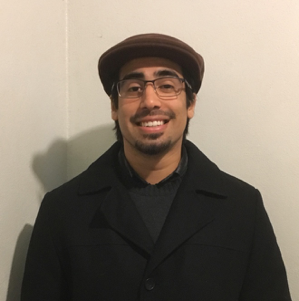 |
Andrew C. Garcia was born and raised in Los Angeles and moved to northern California after high school to attend San Francisco State University. There he received his undergraduate degree (B.A., 2014, Magna Cum Laude) in Psychology with a concentration in Cognitive Neuroscience. This ultimately led him to the lab of Amy L. Griffin at the University of Delaware where he has continued to pursue his interest in the neurobiological substrates of memory. His graduate work uses a combination of electrophysiology, optogenetics, and behavioral assays in aim of understanding how two key areas, the hippocampus and the prefrontal cortex, interact during spatial working memory-guided decision making. Outside of the lab he has developed a STEM outreach program that brings interactive science workshops to students from racial/ethnic backgrounds historically underrepresented in the sciences. His recreational interests include hiking, camping, and anything outdoors.
|
 |
Mani Garcia-Lesy is a doctoral student in the CUNY Health Psychology and Clinical Science program based at Hunter College. He received his B.A. and M.A. in Psychology from Stony Brook University. Mani is interested in improving access to physical/mental health education, assessment, and interventions for underserved groups. Currently his research is focused on implementing mixed-method community based protocols with Deaf and DeafBlind adults, and disconnected emerging adults in New York City. Innovative development and use of digital research methods are central to his work, including: (1) methods for portable central and peripheral psychophysiology and digital ecological momentary assessment; and (2) methods for better understanding the role of mindfulness and movement literacy in health and well-being (see bullettrun.com). Mani’s advisor is Dr. Regina Miranda at Hunter College.
|
 |
Aileen Marie García-Vargas is a PhD student at the University of Puerto Rico Medical Sciences Campus. She earned a B.S in Biomedical Science at the Inter American University of Puerto Rico, Ponce Campus. As an undergraduate, she completed research training at the Pennsylvania State College of Medicine (Penn State) as part of the Short-Term Research Experience for Underrepresented Persons (STEP-UP) Program, under the guidance of Dr. Brian Barth, where she was exposed to many aspects of cancer biology and drug design. Her research explored the role of nanoliposomal C6-Ceramide for the treatment of acute myeloid leukemia. After graduating, she was a research assistant at Virginia Commonwealth University in Richmond, Virginia. While at VCU, she worked with breast cancer and lung cancer. She is currently pursuing her PhD in Pharmacology and Toxicology focused on prostate cancer, under the guidance of Dr. Magaly Martínez-Ferrer. She is a RISE fellow and her research focuses on the role of biomarkers as a prognostic tool for prostate cancer. When she is not in the laboratory, she enjoys her free time participating in outreach activities and several student organizations.
|
 |
Shaimar R. González Morales was born and raised in southeast Puerto Rico. Since she was a little girl, she was interested in knowing how plants and animals develop. As she grew older, she became interested in the use of genetics tools to alter DNA in a way that is beneficial to an organism. Therefore, she pursued a bachelor’s degree in biology from the University of Puerto Rico Mayagüez (UPRM) Campus where she obtained her first research experience in molecular biology. After graduating from UPRM, she pursued a master’s degree in biological sciences at Marshall University with a research focus in developmental biology. She had the opportunity to participate in internships during her graduate education at the National Cancer Institute, National Institute on Aging and National Eye Institute. She served as the program student chair for the Society for In Vitro Biology for 2014-2015 term. All those opportunities and research experiences motivated her to continue her graduate education. She is currently a first-year student at the University of Texas Health Science Center at San Antonio (UTHSCSA) studying cell biology, genetics and molecular medicine. She is also part of the NIH Graduate Partnerships Program, which will allows her to pursue her dissertation work at National Institute of Dental and Craniofacial Research under the supervision of Dr. Kenneth Yamada.
|
 |
Jeannette A. Huaman received her B.A. degree in biological sciences from Barnard College, Columbia University. Her passion for the sciences led her to pursue a Masters in biology with a specialization in biotechnology at Hunter College of the City University of New York. Jeannette’s academic prowess led her to win a competitive summer internship at Memorial Sloan Kettering Cancer Center. She has subsequently worked and interned at prestigious institutions such as Mt. Sinai School of Medicine and Rockefeller University, respectively. Jeannette is currently a doctoral candidate at The Graduate Center of the City University of New York, where she studies circulating tumor cells and how these contribute to metastasis in solid organ cancers. Jeannette keeps herself busy as the newly elected Biology Representative of her PhD program, mentoring both high school and college students, and enjoys spicing it up with Latin dancing and hip hop on the side. Jeannette is very proud of her Peruvian upbringing and seeks to establish herself as a successful Latina in the STEM field. Her long terms goals include planting “las semillas del triunfo” (the seeds of victory & knowledge) in her future students and encouraging them to reach their maximum potential. |
 |
Simara Laboy López completed her Bachelor’s degree in Chemistry at the Inter American University of Puerto Rico Metropolitan Campus back in 2014 and graduated Magna Cum Laude. She is currently pursuing her PhD in Bio-Analytical Chemistry in the University of Puerto Rico, Rio Piedras Campus. Under the guidance of Dr. Eduardo Nicolau, her research is focused on regeneration of bone density loss for people experiencing osteoporosis. Simara was the 2016 winner of Singularity University’s Global Impact Competition Puerto Rico and spent the summer learning about exponential technologies and how to leverage them to solve the world’s greatest challenges. Upon her return to the island, she became a member of PRatian, LLC. The mission of this company is achieving a greater involvement of the community in research and commercialization of space related projects and products. Besides academia related subjects, her other interests are traveling, photography, diving, hiking and dancing.
|
 |
Rocío Medellín-Soliván completed her bachelor’s degree in General Sciences at the Pontifical Catholic University of Puerto Rico in Ponce. As an undergraduate, Medellín-Soliván participated in biophysical research, mainly studying interactions between cancer-linked transmembrane receptors that control cellular processes including growth and development of various body systems, and several components of the cytoskeleton. She is currently pursuing a Ph.D. in Clinical Psychology at the Ponce Health Sciences University in Ponce, Puerto Rico, and working as a research assistant in the University of Puerto Rico’s Institute of Psychological Investigation in Río Piedras. Her research interests mainly pertain to Health Psychology, specifically the relationships between chronic physical illnesses and mental health issues, including depression and suicidality. She is also interested in how social media impacts mental health and psychosocial processes. |
 |
Diana Medina was born in California and raised in Puerto Rico. The daughter of a Mexican mother and a Puerto Rican father, she is currently a graduate student in Texas A&M University pursuing a doctoral degree in Genetics. She works in Dr. Jon Skare’s laboratory where she studies the causative agent of Lyme disease, the spirochete Borrelia burgdorferi. Her thesis project is evaluating the importance of small regulatory RNAs (sRNAs) molecules in infection, to better understand the virulence factors the bacteria uses to be a successful pathogen in the host. She completed her bachelor degrees at the University of Puerto Rico, Mayagüez in Industrial Microbiology and General Biology. As an undergraduate student, she worked under Dr. Taras Oleksyk in identifying the frequency of genetic mutation CCR5-delta 32, which confers resistance to HIV, in adults of town Quebradillas, PR. After this exposure to research, she went on to participate on a research experience for undergrads (REU) during the summer of 2012 under Dr. Trina McMahon in University of Wisconsin, Madison. There she studied a decade of water samples of Lake Mendota and the dynamics of Actinobacteria. Diana’s interests include traveling, hiking, cooking and volunteering in science outreach for children through different programs from the university. She is an ambassador of the Educational Outreach Program where she goes to elementary schools and facilitates science workshops for children. She is also part of WISE (Women in Science and Engineering) where she motivates young girls to be interested in science as a potential career.
|
 |
Francheska M. Merced-Nieves is a third-year Ph.D. student in the Neuroscience Program at the University of Illinois Urbana-Champaign. She is also part of the Illinois Kids Development Study (I-KIDS), which lead by Dr. Susan L. Schantz. I-KIDS studies how prenatal exposure to endocrine disruptors like Bisphenol A (BPA), phthalates, and parabens can affect aspects of infants’ cognitive development during the first year of life. Her project focuses on assessing whether maternal stress during pregnancy is modulating sexually dimorphic aspects of cognitive development in 4 to 5-month-old infants. She is also interested in assessing whether maternal stress is modulating the effects of other endocrine disruptors, like phthalates, on sexually dimorphic aspects of cognitive development.
|
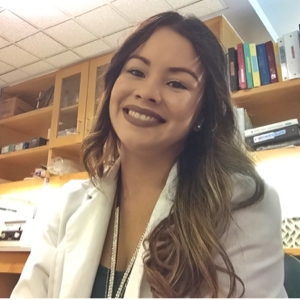 |
Greisha L. Ortiz-Hernández is a Ph.D. student in the Division of Pharmacology at the Loma Linda University School of Medicine (LLUSM). She holds a B.Sc. in Biology from the Universidad Metropolitana (UMET) in San Juan, Puerto Rico. As an undergraduate student, she completed research training in the fields of Bioinformatics, Biochemistry, Neurosciences and Immunology. Greisha complemented her education through three summer research internships: The University of Vermont (UVM), Universidad Central del Caribe (UCC) and LLUSM. During her bachelor´s degree, she earned multiple recognitions and awards. Some of them: Best Poster Presentation at the 2013 AGMUS Symposium, Excellence List Award of UMET, over 5 travel awards to assist to scientific national conferences, and a science scholarship. As a leader, she was the president of an Ecology chapter in UMET and mentor for high school students at the AGMUS Institute of Mathematics Saturday Research Academy. Greisha is actually part of the IMSD-NIH program, which provides full support for graduate students. Her main research interests are to understand the regulation of cell death and survival in prostate cancer health disparity, under the direction of the renowned scientist Dr. Carlos A. Casiano. When not in the laboratory you can find Greisha cooking, hiking, and taking pictures of the beautiful landscapes of California, Utah, and Arizona. She is also an active volunteer for her university, church, and community. This led her to be awarded a scholarship from The Hispanic Alumni of Loma Linda (HALL) for being involved in the Hispanic community. |
 |
Alexandria Oviatt is a first-year graduate student in the Quantitative Chemical Biology program at Vanderbilt University. Owing in large part to an enthusiastic teacher and mentor in high school, she became passionate about chemistry and went on to earn a B.A. in Biochemistry from Barnard College. At Barnard, she worked in the lab of Professor Christian Rojas focusing on the synthesis of 2-amino free-reducing sugars. She hopes to combine her love of organic chemistry and her increasing fascination with the study of disease for her doctoral work. She is currently involved in the Vanderbilt University Women in Science and Engineering organization and plans to take part in more of the outreach opportunities available through this organization. Outside of the lab, she enjoys baking and hiking.
|
 |
Rebecca M. Parodi-Rullán obtained her B.Sc. in genetic biology with a minor in psychology in 2009 from Purdue University. As an undergraduate, she did research on developmental neurobiology under the supervision of Dr. Donna Fekete and was awarded the Sandy and Zippy Ostroy Research Experience for Undergraduates award. Currently, she is a 4th year Ph.D. candidate at the University of Puerto Rico Medical Sciences Campus under the mentorship of Dr. Sabzali Javadov. Her thesis is focused on studying the role of mitochondria in mediating cardiac dysfunction during myocardial infarction. In 2013, Rebecca was awarded the Society for Free Radical Biology and Medicine mini-fellowship which allowed her to travel to the University of Rochester to learn a new technique. Additionally, she is a NIH MBRS-RISE recipient and serves as a graduate councilor to the Puerto Rico Physiological Society, a chapter of the American Physiological Society (APS). Her research and academic performance has been recognized by the Dean of Biomedical Sciences (2015) and she was awarded honor enrollment by the Deanship of Academic Affairs in 2016. Enthusiastically, she participates in community outreach activities and in the APS Physiology Understanding (PhUn) Week attempting to share her passion for science to the youth. During her free time, she enjoys running and playing soccer. In the future, as an established scientist, she hopes to hold a position in Puerto Rico where she can help inspire and guide the next generation of scientists.
|
 |
Coriness Piñeyro-Ruiz is a Ph.D. student in the Department of Anatomy & Neurobiology at the Medical Science Campus, University of Puerto Rico. Her formal academic training so far includes a Bachelors in Science from University of Puerto Rico - Rio Piedras Campus, and a Masters in Anatomy from the Department of Anatomy and Neurobiology, School of Medicine, UPR under the mentorship of Dr. Nivia L. Pérez-Acevedo. Her Master’s research project evaluated the role of group II metabotropic glutamate receptors (mGluRs) on several forms of anxiety in the female rat model. In addition, the project aimed to determine whether estradiol could modulate mGluRs effects on behavior. Currently, she is in her second Ph.D. year of training under the mentorship of Dr. Juan Carlos Jorge. Her doctoral thesis project aims to study the etiology of hypospadias, which is one of the most common urogenital birth defect among males around the world. Her goal is to provide a large-scale analysis of proteins and metabolic changes according to severity; and to also evaluate whether there is an association between the proteome and the presence of heavy metals in plasma. During her graduate studies, she has served as a teaching assistant in the laboratory of gross anatomy where her interest for teaching and mentoring has become an important academic goal. She has also been part of several extracurricular activities that aim to engage students from middle school up to undergraduates to pursue a career in science.
|
 |
Marcos J. Ramos Benitez obtained his bachelor degree in Biology, at University of Puerto Rico-Humacao, where he researched in two distinct areas, Ecology and Microbiology. Immediately after completing his BS he was admitted to the microbiology doctoral program at the UPR-Medical Sciences Campus, where he is currently a third-year Ph.D. candidate. Marcos works under the mentorship of Dr. Ana Espino as part of an Immunology and Molecular Parasitology laboratory. His thesis project consists in describing the anti-inflammatory role of a Fasciola hepatica fatty acid binding protein and assess the protective effect of this molecule in a non-human primate model for sepsis. In 2016, both the Biomedical Sciences Deanship, and the Puerto Rico’s Association of Microbiologists, awarded Marcos for academic and research excellence. Also, he was the recipient of an ASM travel award. Moreover, he has distinguished himself as a leader presiding the UPR-MSC microbiology association and also representing biomedical sciences students in the academic senate. Additionally, he is very active in outreach activities where the scientific community and general public benefit from research integrated education. After fulfilling his Ph.D. his interests lie in achieving an immunology related post-doc experience to further become a leader scientist. |
 |
Aynette Marie Ramos-Cardona earned a B.A. in Psychology from the University of Puerto Rico, Rio Piedras campus. Sponsored by the NSF Undergraduate Research Mentoring Program: Neural Circuits and Behavior, she did research in analyzing the pathophysiology of addiction to substances, specifically cocaine. She examined the brain areas that comprised the reward-mediating mesolimbic dopamine system in Dr. Carlos Jiménez, Ph.D. laboratory at the University of Puerto Rico, Medical Sciences Campus. As a third year Ph.D. Clinical Psychology student at Carlos Albizu University, in San Juan, she continues to study addictive behavior with an integrative and interdisciplinary approach. Her main focus consists in investigating the role of spiritual intelligence and adherence to treatment of individuals with substance abuse disorder under the close mentorship of Dr. José Martínez-González, Ph.D. She has presented her findings in several international meetings including those on where she has been a selected speaker. |
 |
Naiomy Deliz Rios-Arce is a PhD candidate in the Comparative Medicine and Integrative Biology Program (CMIB) at Michigan State University (MSU). She received her B.S. in Microbiology from the University of Puerto Rico at Arecibo (UPRA). During her undergrad, she worked in different research projects and she also had the opportunity to participate in two summer externships programs at the University of Massachusetts Amherst and in MSU. After college, she was accepted to the Bridge to PhD in Neuroscience Post-baccalaureate Program at MSU. Currently, her work is focused in the study of gut and bone signaling. Specially, she is looking at the role of probiotics on bone health. This work has leaded her to publish two book chapters. She was also awarded with APS Minority Travel Fellowship Award for the Experimental Biology Meting, in which she presented her research. She is currently a trainee in the Broadening Experiences in Scientific Training Program (BEST) at MSU. Besides working in the lab, she enjoys teaching students about science and mentoring.
|
 |
Angelie Marie Rivera-Rodríguez earned her B.S. in Industrial Biotechnology from the University of Puerto Rico—Mayagüez. Her undergraduate research was in Nanomedicine in the Chemical Engineering Department, under the supervision of Dr. Maribella Domenech. Seeking for opportunities, she visited various universities in the U.S. and then she decided to participate in her first conference, the Emerging Researchers National (ERN) Conference in which she obtained the first place in poster presentation. In addition, she was member of the Center for Research Excellence in Science and Technology (CREST, 2015) and was accepted into the MARC UPRM Program for honor students (2015-2016). During her undergrad, she participated in the Summer Undergraduate Research Experience (SURE) program in the University of Wisconsin—Madison in a research focused on microfluidic devices and prostate cancer (2015). Then, Angelie start her first industry experience in Abbvie Biotechnology LTD as a Co-op student (2015). Working for Abbvie, she brings support to upstream and downstream processes for HUMIRA parenteral product. Currently, Rivera-Rodríguez is a first-year Ph.D. student in the Department of Biomedical Engineering in the University of Florida and is working under the supervision of Dr. Carlos Rinaldi. Her research interests are focused on the development and characterization of a drug delivery system for cancer treatment and further eradication. Also, she is a recipient of the National Science Foundation—Graduate Research Fellowship Program (NSF-GRFP) and the Graduate School Fellowship (GSF).
|
 |
Priscila M. Rodriguez Garcia is a Ph.D. student in the Department of Molecular Genetics at The Ohio State University since August 2016. She is also a trainee of the Cellular and Molecular Biochemical Program, funded by the National Institute of Health, at the same university. Priscila earned her B.S. in Industrial Biotechnology from the University of Puerto Rico at Mayagüez (UPRM), where she continued graduate studies in Biology. As an undergraduate, she started her career as a researcher under the mentorship of Dr. Martinez Cruzado. At the time, she worked on identifying genetic variants that are similar between Puerto Ricans and Canary Islanders in the mitochondrial genome. Afterwards, as a graduate student at UPRM she developed a new project seeking to identify genetic variants that affect diabetics in Puerto Rico. She has an interest in astrobiology, having taken astronomy classes as an undergraduate. Her main interest is in basic research trying to elucidate the mysteries of life using molecular tools. |
 |
Cristina Roman-Vendrell obtained her B.Sc. in Microbiology from the University of Puerto Rico in Mayaguez. After graduating, she worked at a Neuroscience laboratory with Dr. Roberto Melendez studying the effects of ethanol on glutamate receptors. Later, she worked for Dr. Guillermo Yudowski working on different projects that aimed to determine the trafficking and signaling of μ-opioid receptor. An important milestone in her research career was having a first co-authored paper on opioid receptor trafficking and later contributing on a chapter for a new book “Opioid Receptors: Methods and Protocols”. These experiences encouraged her to pursue a PhD degree at the Medical Sciences Campus. Currently, she is a 5th year Ph.D. candidate in the Physiology department and member of the NIH MBRS-RISE program. Under the guidance of Dr. Guillermo Yudowski at the Institute of Neurobiology, she focuses on the study of the molecular mechanisms that control G protein-coupled receptors (GPCRs) function, the largest family of signaling receptors regulating neural function and a major target for therapeutic intervention and drug discovery. On May 2016 she successfully presented her Ph.D. thesis proposal entitled, “Cannabinoid Receptor 2 function: Ligand-Dependent trafficking, signaling and cellular expression”. In summer 2016, she participated in the Summer Program in Neuroscience, Ethics & Survival (SPINES) at the Marine Biological Laboratory. There, she had the opportunity of working on a research project studying spinal cord injury with Dr. Jennifer Morgan. As part of her future plans, she wants to pursue a post-doctoral degree and a career in clinical research.
|
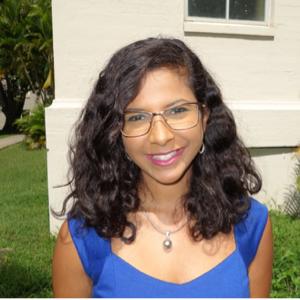 |
Nicolle A. Rosa Mercado is a PhD student in the Molecular Cell Biology, Genetics and Development track of Yale University’s Department of Biological and Biomedical Sciences. She obtained a Bachelor’s degree in Natural Sciences with a concentration in Biology from the University of Puerto Rico at Cayey. As an undergraduate, she participated in the Research Initiative for Scientific Enhancement program through which she did several years of on-campus research on plant genomics. During her summers, Nicolle did research at several institutions including Rutgers University, University of Minnesota, and Yale University. Through these experiences she explored different research topics such as virology, RNA biology, and cancer biology. Currently, Nicolle is interested in studying the processing and function of small non-coding RNAs. Her professional goals include becoming a professor at a research institution and promoting diversity within STEM research. |
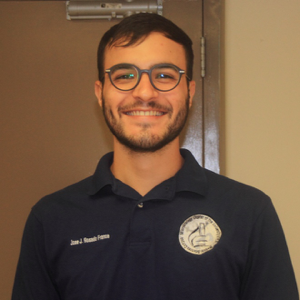 |
José Javier Rosado-Franco was born and raised in Puerto Rico. His passion for Biomedical Sciences started in 2005 when he was part of the Biomedical Research Education Program (BREP). This led him to pursue and complete a bachelor’s degree in Natural Sciences with major in Biology, at the University of Puerto Rico (UPR) at Cayey. During his undergraduate studies he was part of the Research Initiative for Scientific Enhancement (RISE) Program Bridge-to-College course where he had the opportunity of learning a variety of techniques, which lead him to participate in various research projects. Most of his undergraduate research was done under the mentorship of Dr. Vibha Bansal in the Department of Chemistry at the UPR-Cayey where he had the opportunity to work developing nano-particles with affinity to tissue Plasminogen activator (tPA) and later on in the mutagenesis of this enzyme. His work in this laboratory led him to present and be recipient of an award in ABRCMS (2013) and to be co-author of a research article published on a peer-reviewed journal. In 2014, he was accepted in the Department of Microbiology and Medical Zoology at the UPR-Medical Sciences Campus. Nowadays, he works under the mentorship of Dr. Adelfa E. Serrano in the Laboratory of Cellular and Molecular Biology of Malaria and his thesis project focuses on the discovery of novel drugs to treat malaria. Also, he is part of the RISE Program, two graduate student organizations and was awarded in the Deanship of Biomedical Sciences for academic excellence. |
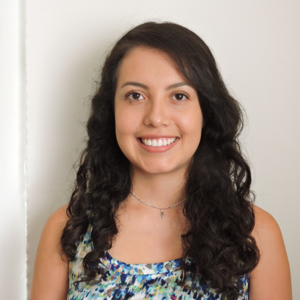 |
Antonieta Salguero is a second-year graduate student in the Chemical Biology Interface (CBI) Program at Johns Hopkins University. She was born in Quito-Ecuador and moved to the United States at 18 years old. She graduated from the University of Florida with a B.S. in Biochemistry and served as an undergraduate research assistant in the laboratory of Dr. Robert McKenna focusing on the crystallization of Carbonic Anhydrase IX mimic for insight on inhibitor specificity. As an undergraduate she participated in the McNair Scholars Program, which was fundamental in her preparation for graduate school. Currently, she works in the laboratory of Dr. Phil Cole where she focuses on the characterization of G protein-coupled receptor kinase 2 (GRK2) using peptide tools. |
 |
Kimberly Santos Avilés graduated from the Inter-American University of Puerto Rico, San Germán Campus with a major in Psychology. During her undergraduate education, she participated in the Ronald E. McNair Post-Baccalaureate Achievement Program, a federal proposal that services low-income, first-generation students interested in graduate studies. Also, she completed an Internship in the Cognition, Affect and Temperament Laboratory at Penn State University. These experiences motivated her to pursue a research career. Currently, she is a Ph.D. student in Clinical Psychology at the Ponce Health Sciences University, Puerto Rico. Her current research interests involve anxiety and trauma-related disorders and neuroscience. She currently works in Dr. Porter’s Neurosciences Laboratory with an interest in molecular and neuronal circuitry of fear memory. Her work aims to determine the effects of different stressors during stages of life on learning and memory processes. |
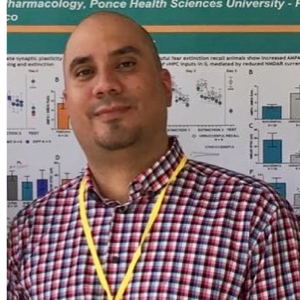 |
Omar Soler-Cedeño is a senior graduate student at Ponce Health Sciences University (PHSU) in Puerto Rico. His first research experiences came when he was an undergraduate student at the University of Puerto Rico in Ponce, under the mentoring of Dr. Edu Suárez. Afterward, Mr. Soler-Cedeño commenced graduate studies at PHSU under the mentorship of Dr. James Porter. It was in this laboratory that Omar started to receive critical training that helped him to achieve early career success. Mr. Soler-Cedeño is currently an NRSA F-31 Fellow and has participated in 4 publications, one first author and three as a co-author. Omar received in 2012 the Driskill Foundation fellowship that gave him the opportunity to spend a summer doing neuroscience research at the Vollum Institute at Oregon Health Science University. Also, Mr. Soler-Cedeño has presented his work at several meetings including the Society for Neuroscience Annual meetings and the Gordon Research Conference in Amygdala in Health and Disease. Omar research work focuses on understanding how contextual information exerts control over fear memories. In his project, he evaluates synaptic connectivity changes between the ventral hippocampus and the medial prefrontal cortex after auditory fear condition and extinction.
|
 |
Orlando I. Torres-Rodríguez is a first-year Ph.D. student in the Biomedical Sciences Doctoral Program at the Ponce Health Science University & Research Institute. He graduated in 2006 from the Puerto Rico Baseball Academy & High School in Gurabo, P.R. That same year, he was selected by the New York Yankees in the 29th round in the 2006 MLB First-Player Draft Selection. In January 2011, he decided to start a Bachelor’s Degree at the Inter American University of Puerto Rico, Ponce Campus. As an undergraduate student, he was part of Dean’s list and received an Outstanding Student Award in recognition of extracurricular activities such as voluntary research work and coaching baseball for kids. In May 2016, Orlando graduated with a Bachelor’s Degree in Science with a Biotechnology major. Currently, he works with Dr. James T. Porter, whose lab is focused on fear extinction learning and memory.
|
 |
Carolina Velez-Grau is a PhD student in the School of Social Work at Columbia University. She holds a degree in Psychology from La Pontificia Universidad Javeriana in Bogota, Colombia, her country of origin, and a Master’s degree in Social Work from Columbia University. Carolina moved from Bogota to New York City in 2000 and began working with American Red Cross September 11 Recovery Program. After completing her Master’s in Social Work, she began working in the Child Psychiatry Department at New York Presbyterian Hospital, where she directed the Home-Based Crisis Intervention program (HBCI). HBCI is a short-term behavioral family centered intervention designed for children and adolescents with suicidal behaviors, psychiatric disorders, and psychosocial or environmental crises. Carolina has extensive experience in adolescent mental health, specializing in suicide. Carolina is interested in the role neighborhood variables play in the mental health outcomes of Latino immigrant adolescents and families. She is particularly interested in studying the mechanisms to ameliorate the impact of community stress, as it relates to the process of acculturation in Latino immigrant populations. At the applied level, Carolina would like to develop community interventions to address stress, reduce negative mental health outcomes-particularly suicide- for Latino adolescents and decrease disparities in access to mental health care.
|









